Gym rules singling out Down’s syndrome children, parents say

- by Admin
- July 9, 2024
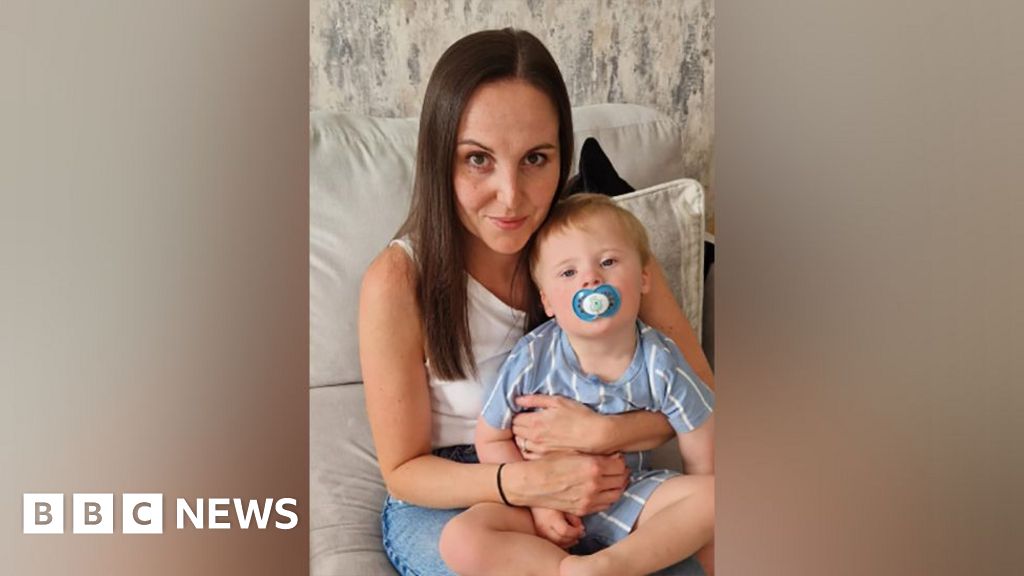
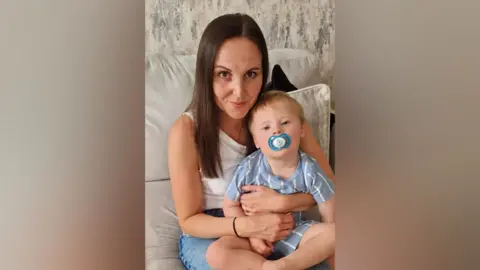 Kirsty Pedelty
Kirsty PedeltyParents of children with Down’s syndrome have accused a gym of discriminating against them by disproportionately targeting safety rules at those with visible signs of the condition.
Families said they were ordered to leave birthday parties and toddler sessions at Spennymoor’s South Durham Gymnastics Club unless they had evidence their children had completed a medical screening.
The club said it adhered to policies laid down by the governing body British Gymnastics (BG).
Following claims of discrimination, a BG spokesman told the BBC that venues are “trying to do the right thing”, but it is reviewing guidelines to “remove barriers” and be more inclusive.
Kirsty Pedelty, from Crook, was 20 minutes into her three-year-old son’s first play session at the club’s Pink Gym when she was asked to take him out.
She said she was told AJ could not use the facilities without medical evidence proving he did not have atlanto-axial instability (AAI), a neck weakness not limited to those with Down’s syndrome.
The club told the BBC it was adhering to a 2021 BG policy that says gymnasts with Down’s syndrome must be screened and approved by the organisation before they can participate in gymnastic activity.
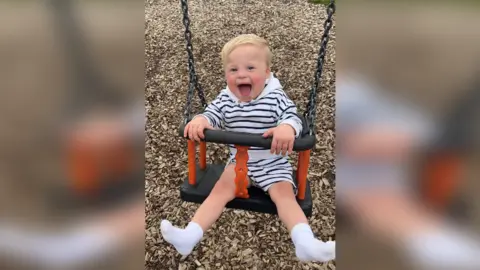 Kirsty Pedelty
Kirsty PedeltyMs Pedelty said AJ did not have AAI, was checked regularly by a physio and was not at the venue for a gymnastics session.
“I feel like AJ was discriminated against,” she said.
“I cried all the way home and am still in shock that this could happen.
“He deserves the right to play like any other child and if any other child is not screened, why should he be?
“I would never put my child in harm’s way and he wasn’t taking part in gymnastics, he was just playing and can’t even jump.
“What kind of message does this send to other children? That those with Down’s syndrome can’t play?”
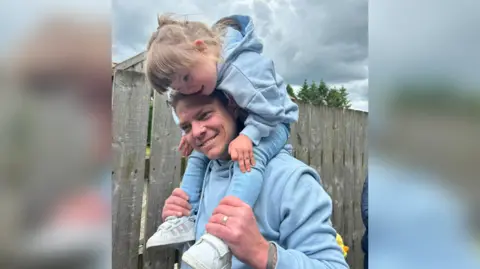 Adam Barnes
Adam BarnesShildon parent Adam Barnes refused to leave when the same club asked him to remove his four-year-old daughter – who has Down’s syndrome but does not have AAI – from a birthday party.
“Amelia was singled out and it put the hairs up on my back,” he said.
“I’ve been around disabled people all of my life and I have never been made to feel like that.
“It got me really angry and it felt like discrimination.
“We try to keep her life as normal as possible and for her to be singled out for her condition in the 21st century, it shouldn’t have happened.
“[AAI] is a condition any child can get. I appreciate children with Down’s syndrome are more prone, but anyone could have it.”
‘Jump through hoops’
Mr Barnes and Ms Pedelty believe the children were targeted because of visible disabilities.
Both feel they should not have to “jump through hoops” to gather medical evidence before their children can attend sessions that do not involve gymnastics.
A spokesman for the South Durham Gymnastics Club said there were inaccuracies in some of the claims, but declined to detail what they were.
He said the club had referred recent complaints to BG “as it is they who are responsible for the policy the club followed”.
Where the policy is applied by clubs, a spokesman for BG said, it is most often “from a starting point of caring for the safety of those taking part in activities and trying to do the right thing”.
BG said its policy has been adopted by organisations beyond its membership and is being used “outside of the scope of activities it was developed for” due to limited resources and guidance for venues such as soft play centres and trampoline parks.
Highlighting its “commitment to be relentless in pursuit of inclusion and accessibility in gymnastics”, he said BG was already working with the Down’s Syndrome Association (DSA) to review and improve the policy and approach currently in place.
A DSA spokeswoman said it was pleased that BG had “recognised a need to review and improve the policy and approach currently in place” regarding AAI screening.
She said the association was working with BG, leisure providers and insurers to ensure unnecessary barriers were removed to allow people with Down’s syndrome to participate.
“The current situation can cause people who have Down’s syndrome and their families unnecessary distress and upset,” she added.
The Latest News
-
December 22, 2024Donald Trump picks Apprentice producer to be the US special envoy to UK
-
December 22, 2024Daily horoscope: December 22, 2024 astrological predictions for your star sign
-
December 21, 2024UK flights and ferries cancelled owing to high winds as Christmas getaway begins
-
December 21, 2024Prince Andrew plans to move to UAE amid espionage allegations: Report
-
December 21, 2024Inside Britain’s saddest shopping centre: Town centre mall empty just DAYS before Christmas as depressed locals say ‘it’s a disgrace’

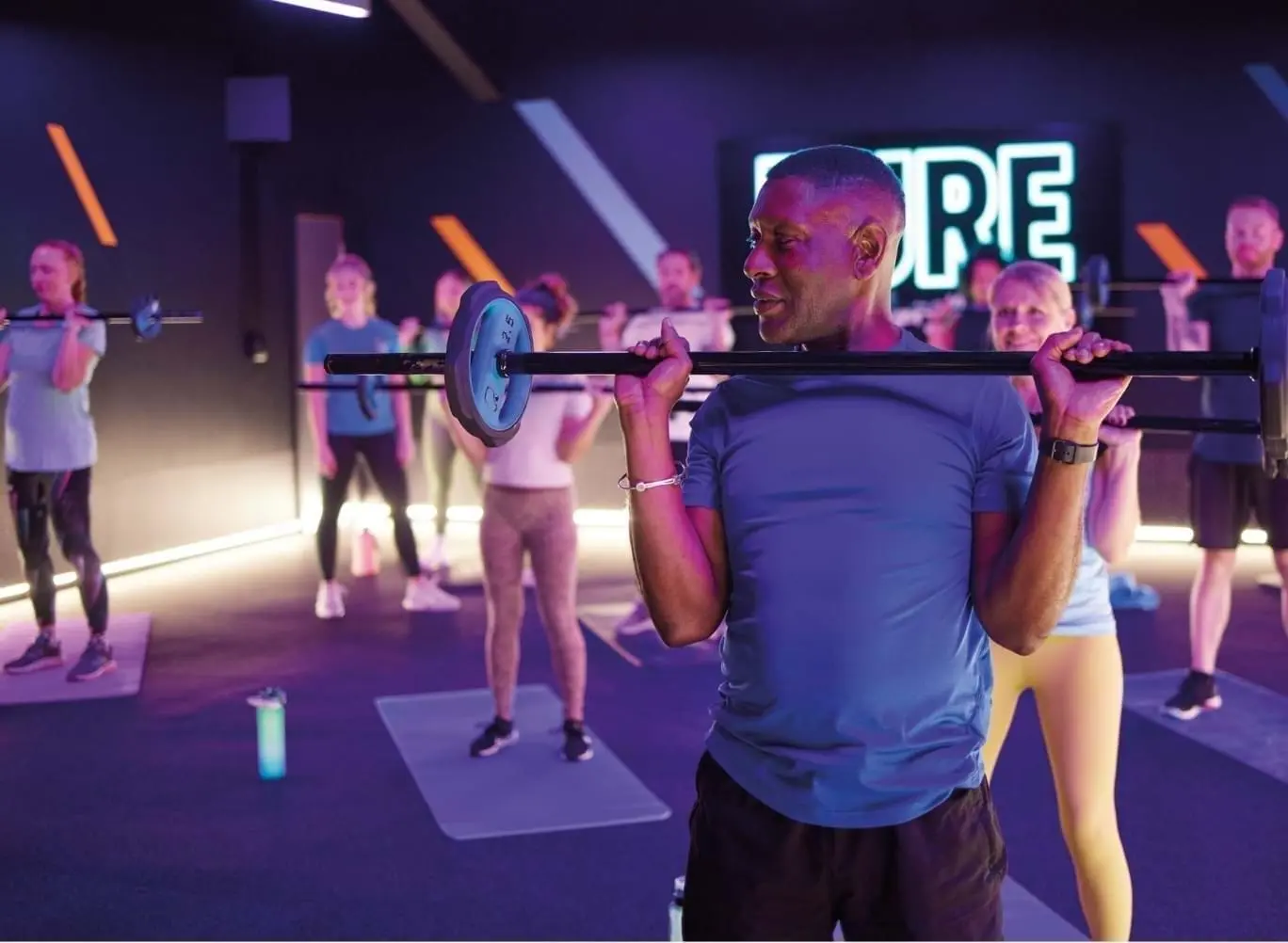



:quality(85):upscale()/2024/11/27/523/n/37141241/adfb626a674703ad43d3e0.56538649_.jpg)
